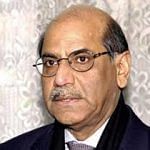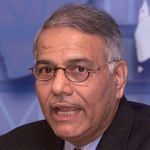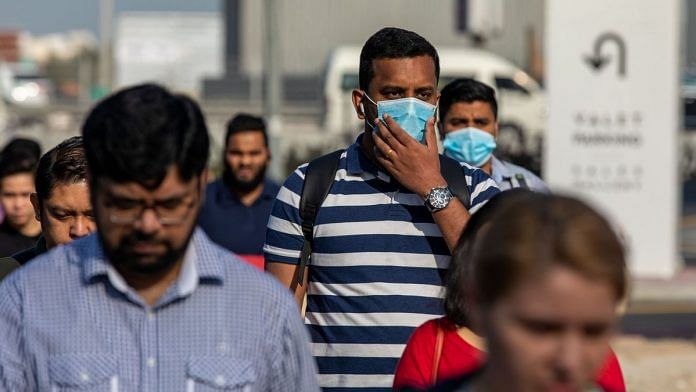 Pandemic and politics
Pandemic and politics
Pratap Bhanu Mehta | Contributing Editor
The Indian Express
Mehta highlights some “distributive fault lines” to watch out for during the coronavirus outbreak. First, any conclusions on the response of democratic versus authoritarian governments “will not be made clear-cut in retrospect”; second, all states, democratic and authoritarian, will likely become surveillance states; third, “as Trump’s attempt to ‘monopolise’ a potential vaccine for America demonstrated, there is a distributive issue in the availability of treatments”; fourth, “deeper regulatory and cultural cooperation” is needed to avoid future risks, which is not easy to produce; fifth, the economic fallout of coronavirus will also lead to distributive issues and sixth, there is potential to accelerate “deglobalisation” in wake of the crisis.
 Debt in the time of coronavirus: Once-in-a-century pandemic is hitting a world economy saddled with record levels of debt
Debt in the time of coronavirus: Once-in-a-century pandemic is hitting a world economy saddled with record levels of debt
Ruchir Sharma | Global investor and author
The Times of India
Sharma warns that “the coronavirus threatens to set off financial contagion in a world economy with very different vulnerabilities than on the eve of the global financial crisis, 12 years ago” in 2008. He argues that the “world is now as or more deeply in debt than it was when the last big crisis hit” and “is again at an all-time high”. He notes, “Economic effects of the pandemic will be magnified not only by its impact on these balky debtors but also by the impact of failing companies on the bloated financial markets.”
 A revival of multilateralism, steered by India
A revival of multilateralism, steered by India
Shyam Saran | writer is a former Foreign Secretary and a Senior Fellow, Centre for Policy Research
The Hindu
Saran says COVID-19 respects no national boundaries and countries must put their difference aside and work on solving the crisis together. He argues that “the COVID-19 pandemic presents India with an opportunity to revive multilateralism, become a strong and credible champion of internationalism and assume a leadership role in a world that is adrift” and an “inspiration for this should come from reaffirming the well springs of India’s foreign policy since its Independence rather than seeking to break free”.
 Covid-19 has redefined security
Covid-19 has redefined security
C. Uday Bhaskar | Director, Society for Policy Studies, New Delhi
Hindustan Times
Bhaskar argues that, “The pandemic threat and its impact on human security was cloistered in the basket of non-traditional security issues and seen as a relative lower policy priority by way of funding and capacity-building.” He says “what the Covid-19 experience has done is to expand and rearrange the concept of national security, make it more inclusive, and foreground human security in a more holistic manner”.
 The opportunities thrown up by Covid-19 that we could take
The opportunities thrown up by Covid-19 that we could take
R Jagannathan | Editorial director, ‘Swarajya’ magazine
Mint
Jagannathan views the coronavirus pandemic’s impact on the Indian economy as an opportunity to “convert fiscal inevitability into opportunity”. Since tax revenues are going to take a hit, this is a chance for GST to be redesigned “in one shot”, he writes. He also suggests that since employment is going to be affected, this could be the time to launch an “urban jobs-and-skills scheme”. This could also be a chance for India to properly reform banking and finance, he adds.
 The coronavirus battle and its ripple effects on the economy
The coronavirus battle and its ripple effects on the economy
Niranjan Rajadhyakshya | Member of the academic board, Meghnad Desai Academy of Economics
Mint
Rajadhyakshya discusses five big shocks endured by the global economy in view of the coronavirus pandemic. These include disruptions to the supply chain, production losses as “people sit at home”, receding economic activity could put companies into financial stress, spending could continue to be restricted even after the pandemic, and finally, oil shocks only “complicate matters”, he writes.
 The Hidayatullah example
The Hidayatullah example
Abhinav Chandrachud | The writer is an advocate at the Bombay High Court
The Indian Express
Chandrachud notes that former chief justice Ranjan Gogoi is not the first judge to be appointed to political office, but this certainly raises questions about the independence of the judiciary. He writes that the government could use tactics to reward judges who decide cases in their favour. He cites the example of CJI Mohammad Hidayatullah, whose last judgment was against the Indira Gandhi government in 1970, even though he was being considered for a post-retirement job. He refused to take up the job and only after a long cooling-off period did he accept the post of Vice President under the Janata government.
 The curious case of an upset FM and an apologetic banker
The curious case of an upset FM and an apologetic banker
Tamal Bandyopadhyay | Senior adviser to Jana Small Finance Bank Ltd.
Business Standard
In view of the video and audio clips of Finance Minister Nirmala Sitharaman calling SBI “heartless” and “inefficient”, Bandyopadhyay discusses the “banking landscape in the northeast”. He explains that Sitharaman was upset over the fact that tea garden workers in Assam had been deprived of banking services for 70 years due to KYC compliance issues. However, the Assam state government “could have ensured the OVDs [officially valid documents] for the tea garden workers in the past two years”, he writes.
 Congress up for resurrection?
Congress up for resurrection?
Yashwant Sinha | Former union minister
The Economic Times
Sinha argues that Jyotiraditya Scindia’s decision to leave Congress and join BJP “is closely intertwined with the future of India’s polity and is, therefore, not just Congress’ ‘internal affair’”. To revive Congress and the Opposition, he makes a few recommendations. These include Congress announcing elections for the post of party president and that no one from the “parivar” will run for it. The “non-parivar” president must be allowed to run the party for the full term and pick a new team, he adds. “A reformed Congress must play its role in standing up to the ‘Emergency like’ conditions”, he concludes.
Today’s Editorials
The Times of India: The daily writes that India must act consistently and compassionately in the battle against the coronavirus. It’s important to make sure that Indians stuck in different parts of the world can get back home through the shortest possible route and be put them in quarantine. It should also make sure that the facilities are clean, decent and hygienic. It suggests that the private labs accredited by the government need to put into services immediately with the government picking up the bill.
Hindustan Times: The daily notes that India’s hesitation in mass-testing for coronavirus is jeopardizing the lives of millions who may be infected but do not have a travel history. It argues that South Korea has brought new infections and death rates to less than 1 percent. WHO has urged countries to test every suspected case, therefore India redefines its outdated testing parameters, the daily says.
The Indian Express: The daily comments on the Rajya Sabha nomination of former CJI Ranjan Gogoi. It says that there can be no doubt that he will be a distinguished presence in the Rajya Sabha, yet, it is equally true that the Supreme Court has come under a deeper shadow. It says that previously there have been similar examples but several wrongs of the past do not make this one right. As Gogoi accepted the offer, he has invited some serious questions on himself and on the institutional operationalisation of the separation of powers, it says.
The Hindu: The Kamal Nath government should prove its majority on the floor in Madhya Pradesh assembly at the earliest, it writes. While the court will offer a solution to the MP crisis, the larger question facing democracy is that of trust and transparency. It notes that “engineered resignations” of lawmakers have become a new tool for sabotaging mandates. The situation now demands new guidelines from the Supreme Court beyond setting a reasonable quick deadline for the floor test, it notes.



